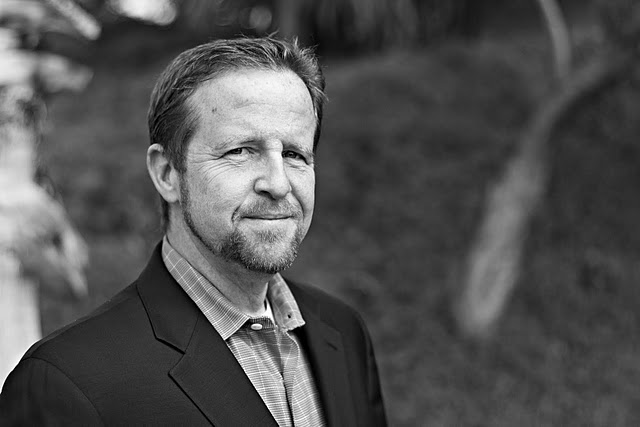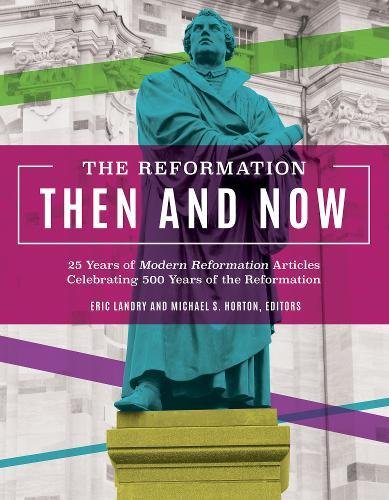Unless you just stopped in from Mars, you already know that the year 2017 is a big year for church history lovers of the Protestant variety—it’s the 500th Anniversary of the Protestant Reformation. And as you are also probably very aware, there is a flurry of publications and conferences throughout this year addressing the theme of the Protestant Reformation.
Hi, I’m Fred Zaspel, executive editor here at Books At a Glance, and one book that has caught our attention is the new The Reformation Then and Now edited by Eric Landry and Michael Horton. Actually, the full title is, The Reformation Then and Now: 25 Years of Modern Reformation Articles Celebrating 500 Years of the Reformation. Dr. Michael Horton is with us today to talk about this helpful book.
Mike, welcome! And thanks for talking to us.
Michael Horton:
Thank you, Fred, it’s always a pleasure, I really appreciate what you are doing.
Fred Zaspel:
First, give us just a brief bird’s eye view of your book. We’ll ask about some particulars next, but for now just tell us about it in broad strokes—the major divisions of the book, the various contributors, some of the issues addressed, and so on.
Horton:
As you mentioned, this is the 500th Anniversary, so there are a lot of different perspectives on the Reformation. Was it a good thing, a bad thing, indifferent? Everybody has an opinion about the Reformation, pro or con, because it had such a huge impact on the church and also on the wider culture. What we do at Modern Reformation anyway, a magazine that has been around for about 30 years, is to look at our own questions and issues today in the light of Reformation theology. We have Anglicans, Baptists, Lutherans, Presbyterian and Reformed. We also have some articles from those outside our ordinary circles. We have a couple of really fascinating essays in there, for example, from Roman Catholic writers and one who is a scholar of Calvin, Alexander Ganoczy, and another who traces some fascinating connections between the reformers and some of the medieval thinkers, particularly Bernard of Clairvaux.
It’s broken down into Part One: the Cause of the Reformation; the Characters, Part Two; and then Part Three is the Consequences; and then finally, a Conclusion. There’s also an Appendix that goes through the basics—who were the reformers, basic Reformation history lessons, and concepts in Reformation spirituality.
Zaspel:
Talk to us about the circumstances that led to the Reformation—beginning maybe with the state of the church at that time. Why the need of Reformation?
Horton:
Nobody actually sat around and said, “Wow, boy, do we ever need to recover the gospel in our time!” It was provoked, really, by the struggle to understand how God can be simultaneously holy and gracious. How can He be gracious to sinners if He is holy and just? Does He just look the other way? Does He transform us enough to where we are no longer unholy and then He can accept us? Or, as the reformers concluded from Scripture, does God impute or credit the righteousness of Christ to us so that we are declared righteous before God for the sake of Christ, received through faith, and then on that basis God begins his work of renewing us and conforming us to the image of Christ by his Holy Spirit. So the Reformation was really an attempt to answer the question, Who is God? Who is this God with whom we have to do, and how do we have a relationship with him that is saving rather than deadly?
Zaspel:
Why does the question of free will, Pelagianism, and Semi-Pelagianism have such a prominent role in your book? How as all this important in the Reformation? And how did Luther and others respond?
Horton:
Of course, as you know, that was a huge central question. For those who might not know those terms, Pelagius was a contemporary of St. Augustine. He came to Rome and saw all sorts of immorality and drew a straight line from what he saw to the teaching of Augustine; namely, that we can’t do what God commands apart from grace. And Pelagius said, that’s a copout; we can do whatever it is that’s necessary; Adam only affected us as a bad example; if we follow Christ as a good example then we can get ourselves out of this mess. And so for Pelagius, grace meant nothing more than God telling us what to do, God giving us his law and providing a way for us, basically, to save ourselves. Semi-Pelagianism was a heresy that taught that we need grace, but you take the first step with your own free will, you accept Christ, and then you will receive the grace necessary to persevere in the Christian faith. Both of those heresies were condemned by successive councils of the early medieval church. They were condemned as denying the Gospel, denying the teaching of Scripture that we are dead in sin and that we need grace, right from the beginning, in the middle, and at the end. Semi-Pelagianism was pretty widespread at the time of the Reformation. If there was a popular bumper sticker in the Middle Ages, it would have been this: God will not deny his grace to those who do what lies within them. That was the basic phrase that summarizes what a lot of people got when they went to church every Sunday, or what they got just by osmosis in the culture. Basically, do your best and God will take care of the rest. Well, the reformers came along and said, you don’t understand how serious sin is. It’s not just things we do, it’s who we are. And we can’t heal ourselves, we can’t raise ourselves from the dead. It’s grace from beginning to end. It’s Christ from beginning to end. None of our merits, the merits of Christ alone are the basis for our salvation, and it’s received through faith alone. That’s why it was revolutionary in its time. People were looking to themselves, basically, for salvation.
Zaspel:
How did all this bear on the doctrine of justification by faith?
Horton:
Well, that was the linchpin. Martin Luther said, all that I’ve been taught in the schools was about God’s righteousness that is our standard. So, in other words, what Paul talks about in the first three chapters of Romans, the righteousness of God revealed that condemns us. That righteousness of God is revealed in the law. But then it hit Luther between the eyes when he got to Romans 3:21 and it says, but now God’s righteousness is revealed apart from the law, although the Law and the Prophets testify to it, namely, through the gospel that those who believe in Christ are declared righteous freely, they receive this righteousness as a gift. That was just amazing! So now, God’s righteousness is not only the righteousness that condemns us, but the righteousness that God gives us, so that we can stand in his presence. So justification is not just as if I’d never sinned, that’s just forgiveness, which is great, but not enough. Justification is just as if I’d never sinned and had perfectly fulfilled the law myself, because Jesus’ fulfillment of the law is imputed or credited to me by faith.
Zaspel:
Highlight for us some of the primary contributions of the Reformation. Why was – or is – the Reformation significant?
Horton:
A lot of secular historians who don’t have much interest in the doctrine that really drove the reformers, nevertheless, point out the revolutionary impact that their message had on particularly, the idea of callings, vocations, in this world. Calvin made the point that a monk is in a triple mess. First of all, he is offering his works to God for repayment, and so God is offended because God is in no one’s debt. The monk himself isn’t helped by that, he’s only further condemned because he is arousing God’s anger toward him. And then he’s also not serving his neighbor. He’s not doing anything there in the monastery that helps his neighbor. A milkmaid, milking a cow that day, is doing more for her neighbor than a monk. Instead of that, when people are released from their sense that they have to offer God their good works, they are freed, now, to offer their neighbor their good works. Martin Luther had a great line. He said, “God doesn’t need your good works, your neighbor does.” God has called all of us out of the monastery into the world to love and serve our neighbor through our callings.
Zaspel:
Is the Reformation over?
Horton:
I sure hope not. I’m not even really sure, Fred, if the Reformation quite stuck. I think that a lot of Protestantism today is worse than anything that the reformers faced in the 16th century. You look out at Protestantism and there is no debate between the reformers and the Pope over whether the Bible was the inerrant inspired word of God, or whether the culture should lead or Scripture should be our authority. The real question of the Reformation was whether tradition should be on the same par with Scripture. Today we are dealing with a lot of Protestants who are further afield than Roman Catholics were in the 16th century. But then we’re also dealing with outright Pelagianism. A lot of what is taught in churches week after week is not even Semi-Pelagianism, but outright Pelagianism. That’s a quote I get from my friend Roger Olson who is an Arminian. He has stated that a lot of what is called Arminianism in America, today, is actually Semi- or even outright Pelagianism. When I gave that slogan of the medieval church, “God will not deny his grace to those who do what lies within you,” the contemporary version of that people always pick up on is Ben Franklin’s line, “God helps those who help themselves.” And the tragedy is that 86% (well, first of all, 65% of America’s evangelicals said that they agreed with that) and 86% thought that it was a quotation from the Bible. So we’re in a mess!
Zaspel:
You have a sitting US Senator contributing a chapter in your book – that’s not something you see every day!
Horton:
Exactly. Ben Sasse was actually the editor of Modern Reformation, and he was also Executive Director of White Horse Inn, the parent organization, and the Alliance of Confessing Evangelicals way back when, when we were under the Alliance umbrella. Ben is a very close friend and has contributed so many articles to Modern Reformation over the years, and it’s a real pleasure to have him included.
Zaspel:
One unusual feature of your book is that the chapters are all pretty brief—just a few pages each. That of course is because they are taken from a magazine you edit, The Modern Reformation. Tell us about that, and tell us about this ministry.
Horton:
Sure, thank you for that, Fred. We’ve been around for about 30 years. We started it as sort of a written version of what we do with White Horse Inn, which is a syndicated broadcast/podcast. It’s basically a conversation across the denominations, but within the Reformation orbit. Anglicans, Presbyterians, Lutherans, Baptists, Independents who are committed to the basic tenants of the Reformation and thinking through how we can approach contemporary questions and issues in the light of that. We’re really excited to continue that conversation (we call it conversational theology) and it’s been a real privilege to be part of that.
Zaspel:
We’re talking to Dr. Michael Horton of Westminster Seminary West, in California, and of the Modern Reformation Magazine, and of the White Horse Inn, about his new book, The Reformation Then and Now—an excellent and enjoyable contribution to Reformation studies for this important 500th Anniversary year.
Mike, thanks for talking to us today.
Horton:
Always a pleasure. Thank you, Fred.

